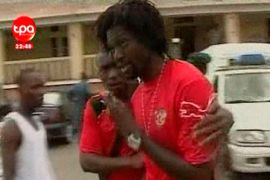Togo banned from Cup after attack
Team ruled out of next two Africa Cup of Nations for pulling out after bus was attacked.

 |
| The tournament has continued peacefully since the killings [Reuters] |
The Togo national team has been punished for pulling out of the Africa Cup of Nations after a deadly attack on their bus, with football chiefs banning them from the next two editions of the tournament.
In a statement released on the eve of Sunday’s final between Egypt and Ghana in the Angolan capital Luanda, the Confederation of African Football (CAF) said the withdrawal of the team had “contravened regulations.”
It comes nearly three weeks after two members of Togo’s delegation were killed when rebel fighters opened fire on their travelling party in the disputed northern territory of Cabinda on January 8, prompting their government to recall the team for three days of mourning.
“The players publicly expressed their willingness to return to the Nations Cup to compete. But the Togo government decided to call back their national team,” Saturday’s statement said.
“The decision by political authorities contravenes CAF and African Nations Cup regulations. The executive committee therefore has banned Togo from the next two African Nations Cup and fined the Togo FA 50,000 US Dollars.”
Warned
CAF president Issa Hayatou reiterated on Friday that organisers had warned Togo not to travel by bus when they travelled from Congo-Brazzaville into Cabinda for the start of the tournament.
|
“We are not the police, we are not military, we are only the organisers of the competition” Sepp Blatter, Fifa president |
Speaking at the same press conference in Luanda, Sepp Blatter, president of world governing body Fifa, said that it was up to the authorities and not organisers to protect players.
“We are not the police, we are not military, we are only the organisers of the competition,” he said.
Togo, captained by Manchester City star Emmanuel Adebayor, initially wanted to compete in Group B with Ivory Coast, Ghana and Burkina Faso, but quit on their national government’s orders.
They left Cabinda to return home on the evening of the start of the competition on January 10.
“I told the players that we understood their position,” Hayatou told Agence France Presse on Saturday.
“We asked them to remain, but that if they decided to leave we would take action. And the players told us they would remain. Up to that point we were in agreement.
“But when there was political interference we couldn’t accept that.”
He said the Togo case was identical to one involving Nigeria who were withdrawn from the 1996 edition on their national government’s orders.
‘Political interference’
“That was political interference and we banned the Nigeria team for the next two editions under article 78 of our rules,” he said.
“There are no exceptional circumstances where political interference to withdraw a team is concerned.
“If the Togo players had decided to quit due to their emotion and suffering then we would have been understanding.”
CAF’s decision to punish Togo appears to be at odds with their position on the matter four days after the attack.
General secretary Moustapha Fahmi announced at the time: “Given that the president of CAF has accorded every flexibility to Togo there will be no punishment in the event that they pull out.”
Cowering
The attack occurred as the Togo convoy drove into Cabinda from Congo-Brazzaville, leaving players cowering under their seats during a 20-minute gun battle with security forces.
Communications chief Stanislas Ocloo and assistant coach Abalo Amnalete were killed and goalkeeper Kodjovi Obilale was among the injured.
The armed wing of the Front for the Liberation of the Enclave of Cabinda (Flec), embroiled in a decades-long separatist struggle, claimed responsibility for the attack.
Organisers rejected calls for the 2010 tournament to be scrapped with security beefed up in Cabinda and the three other venues in Luanda, Benguela and Lubango.
Despite fears of more attacks the competition, which reaches its climax with Sunday’s final between champions Egypt and Ghana, has passed off peacefully.